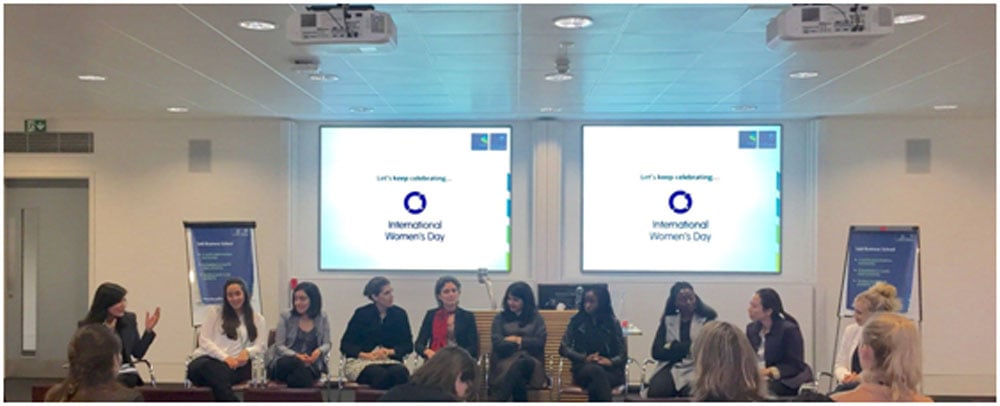In conversation with Pakistan’s Oxford Award winner Kanza Azeemi
Kanza Azeemi is a Pakistani student who received Oxford Award a couple of weeks ago. She was the only Pakistani from her batch of 327 students from 58 countries. Kanza studied from Karachi Grammar School and LUMS in Pakistan.
In an interview with The News she described her experience at Oxford as intellectually stimulating in a diverse setting.
“Oxford is an overwhelming magical place. The best part about going to a business school that’s embedded in an 800-year old university is the amalgamation of the city’s historic character and the school’s modern, state-of-the-art teaching,” she said.
Talking about the contribution in her success Kanza said her teachers at Oxford encouraged healthy debates and made teaching experience unique. She called her colleagues competitive yet cooperative.

Picture from the event that Kanza (far left) pioneered on International Women’s DayContrary to the perception of discrimination being faced by Muslims abroad, Kanza called Oxford a place for dialogue and debate instead of violence and terror. She added, “During my time in the UK, there were many reports of hate crimes against Muslims and it incited fear and apprehension particularly in family and friends at home.”
Kanza wants to work for women empowerment and is determined to play part for the social and economic development in Pakistan. “No nation can succeed when 50% of its population is deprived form basic necessities; it’s a human issue,” she emphasized.
Kanza was a recipient of two scholarships including Said Foundation and Chevening Scholarship.

Picture from the ceremony at the Sheldonian Theatre where Kanza received her PrizeShe believes Pakistan has been represented very positively by the youth in recent time. “It is the youth of Pakistan that has potential to turn things around, let’s not let that potential go to waste,” Oxford award winning student concluded.
-
Security forces gun down 30 terrorists in multiple IBOs in KP: ISPR
-
MQM-P calls for new province in Sindh
-
US report validates Pakistan military edge over India: PM
-
Banned TTP poses serious threat to Pakistan security: UNSC panel
-
CM Afridi clarifies remarks on by-poll after ECP requests army deployment
-
Dubai sees 3.2m Pakistani passengers in 2025 as airport sets new milestone
-
Security forces kill 23 Indian proxy terrorists in KP's Kurram
-
Pakistan to construct island to boost oil exploration: report











